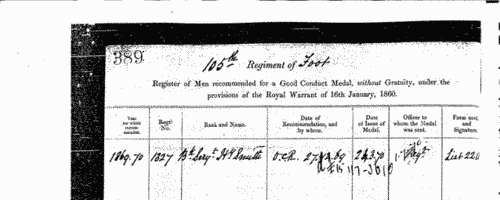Mcginty Surname Ancestry ResultsOur indexes 1845-1865 include entries for the spelling 'mcginty'. In the period you have requested, we have the following 3 records (displaying 1 to 3):
Buy all | |
| Get all 3 records to view, to save and print for £24.00 |
These sample scans are from the original record. You will get scans of the full pages or articles where the surname you searched for has been found.
Your web browser may prevent the sample windows from opening; in this case please change your browser settings to allow pop-up windows from this site.
Destitution in Donegal (1858)
Hearing of extreme distress in Gweedore and Cloughaneely in Donegal (including Tory Island), an investigation was made by a group of clergymen, gentlemen and newspaper reporters, who found a large part of the populace (800 families) to be in severe poverty - clad in rags, barefoot, living in mud hovels, without furniture, beds or bedding, and subsisting for much of the year only by scavenging seaweed and shellfish from the seashore - beset by rapacious landlords (with their apparatus of lawyers and bailiffs) raising their rents and confiscating the mountain lands on which the poor had relied for pasture. A parliamentary Select Committee was appointed to investigate: its report includes detailed minutes of evidence of their investigations, including testimony relating to many named individuals who had coped with the local crisis and survived, or those who died, and lists of those whose cases had been looked into. The landlords rebutted any suggestion of impropriety, suggesting that when the investigation was made 'a great deal was got up for the occasion' by an inherently dirty peasantry that kept their animals in their houses, in the hope of obtaining relief money (which, to the tune of £3,200, had been received, mainly from England). Seaweed was remarkably nutritious. It was remarked that 'some of the men go to England and Scotland to earn money' and that 'a few young people emigrate yearly to join their relations in America and Australia'.
MCGINTY. Cost: £8.00.  | Sample scan, click to enlarge

|
 Outstanding soldiers of the 38th regiment of Foot
(1860-1870) Outstanding soldiers of the 38th regiment of Foot
(1860-1870)
The 35th (The 1st Staffordshire) Regiment of Foot embarked for India in 1857, after fighting in the Crimea. It was serving in India in 1860. It helped suppress the Indian Mutiny, took part in the capture of Lucknow, and returned to England in 1872: the regimental depot was at Colchester. Each year just a handful of outstanding soldiers of the regiment were chosen for good conduct medals and gratuities: these are listed here. There were two lists, one for men recommended for the Good Conduct Medal without a gratuity, and one for gratuities - £5 to a private, £10 to a corporal, and £15 to a serjeant. Both lists are indexed here, and each gives rank, name, regimental number, date of recommendation and date of issue. (The sample scan is from the 105th foot)MCGINTY. Cost: £8.00.  | Sample scan, click to enlarge

|
 Men of the 40th Regiment who fought in the New Zealand War
(1863-1870) Men of the 40th Regiment who fought in the New Zealand War
(1863-1870)
New Zealand War Medal roll for the 40th (2nd Somersetshire) Regiment of Foot: for service in the New Zealand campaign 1863 to 1866: the rolls were compiled following a general order in 1869 and the medals were distributed in 1870. The regiment, although called the 2nd Somersets, was based at Birr in Offaly. It embarked for New South Wales 14 July 1852, and was moved to New Zealand in 1860; the men returned to England in 1866, and thence back to Ireland in 1869.MCGINTY. Cost: £8.00.  | Sample scan, click to enlarge

|
Research your ancestry, family history, genealogy and one-name study by direct access to original records and archives indexed by surname.






